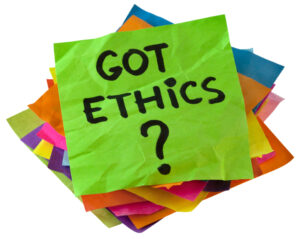You’re a good employee. You have ethics. 
Then, one day you realize your supervisor doesn’t. He’s worked out a deal where your company buys products from a company he and his wife own for project he oversees. This company charges your company three times the going rate for their products but no one dares raise the issue as your supervisor runs the project and approves the invoices.
You consider going to the General Manager but hesitate. He and your supervisor are fishing buddies. You confide in a peer who says, “Look, no problem, we’re passing the whole expense to the client.” In other words, if the cheating doesn’t cost your company, who cares?
Except you do.
What should you do?
For years and increasing numbers, many have stayed silent. As a country, we’ve numbed ourselves to company leaders who squeeze employee paychecks to secure profit margins that provide them exorbitant bonuses which result in mass layoffs. We’ve learned multiple defense contractors rip off American taxpayers by charging the military $150 for $2 parts. Some manage to tell themselves it doesn’t matter because it doesn’t cost them personally.
Except it does – it costs all of us and we can’t allow it any more. When you see something not right, speak up. No job is worth sacrificing your integrity.
Five years ago, Paul Blakeslee confronted a similar situation. He worked for a company, Shaw Environment and Infrastructure, which maintained facilities at two military bases. When Blakeslee learned Shaw’s senior project manager owned one-third of another private company that leased $2 million of equipment to Shaw, often without competitive bidding, he decided to write a letter to his company’s CEO, convinced if the right people knew what was going on they would make things right.
According to Blakeslee, the project manager had systematically gotten rid of everyone who knew what he was doing and when the project manager realized Blakeslee’s intentions, he fired him. For Blakeslee, the experience was devastating, saying “I’d never been let go from a job in my life.”
Although two company vice presidents terminated the project manager within the month, they didn’t reinstate Blakeslee. “What really got me,” said Blakeslee is that “their code of conduct said if someone does not report a wrongdoing, a conflict of interest, they will be fired. I reported it. Now there’s other people who went along with the project manager’s scam – who knew about it and didn’t report it -- and they all got promoted. The employee who told the project manager I planned to send the letter got my office.”
Blakeslee sued Shaw for wrongful termination. In 2013, a jury ruled for Blakeslee, stating Shaw wrongly fired him as retaliation against whistle-blowing, awarding him $3.5 million in punitive and other damages and lost wages.
Although Shaw’s attorney said the jury shouldn’t hold the conduct of a “couple bad apples” against Shaw, the jury saw it otherwise. As Blakeslee’s attorney said in his closing argument to the jury, “You get to stand up, not just for Mr. Blakeslee, but for everyone and say this kind of conduct is not acceptable.”
What could Shaw senior management have done differently? A lot. Even though senior executives didn’t themselves decide to fire Blakeslee, they didn’t commend him for following their own code of conduct nor promptly reinstate him when they learned the truth behind his letter.
According to Blakeslee, “Shaw’s chief compliance officer could have turned around this situation in a minute by doing an investigation and reinstating me. She and Shaw instead treated me as collateral damage.”
Finally, when not backed up by an ethical company culture, company codes of conduct become worthless paper or worse, a mockery followed by those who risk their jobs to do the right thing. When they have the guts to speak out against corruption, they do their companies and the rest of us a service. For this, they need to be honored and protected against retaliation.
Are you looking for proactive and healthy ways to prevent ethics violations? You can download our FREE Ethics Checklist for Business Leaders here. [box type="download"]
Ethics Checklist for Business Leaders
Fill out this form to download this FREE checklist.
